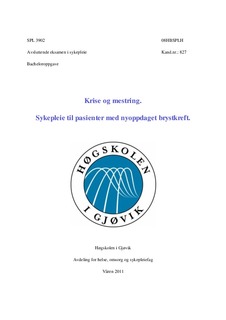Krise og mestring. Sykepleie til pasienter med nyoppdaget brystkreft.
Bachelor thesis
Permanent lenke
http://hdl.handle.net/11250/142751Utgivelsesdato
2011Metadata
Vis full innførselSamlinger
Sammendrag
NORSK: Temaet i denne oppgaven er krise og mestring, og hvordan sykepleiere kan yte best mulig sykepleie til pasienter med nyoppdaget brystkreft. Oppgaven omhandler kvinner, som enda ikke har gjennomgått klimakteriet. Med dette kan de være svært unge når diagnosen inntreffer. Oppgaven er en litteraturstudie, og er basert på tidligere forskning i form av artikler, bøker og valide nettsteder. Møtet mellom pasient og sykepleier finner sted på en kirurgisk sengepost. Vi har funnet ut at sykepleieren som en støttespiller er svært viktig i denne fasen som kvinnene er inne i, på grunn av at vi sitter på mye kunnskap. En annen ting er at vi heller ikke har et personlig forhold til pasienten, og det kan være godt for kvinnen å prate med noen andre enn sin egen familie. Noe annet som er viktig for en sykepleier i denne fasen, er at man skal kunne klare å håndtere ulike mestringsstrategier som pasientene tar i bruk når man får en slik diagnose. Vi skal også være støttespillere i forhold til valg av videre behandling. Her er det viktig at pasienten selv er den som tar valget, og at ikke vi uttrykker vår personlige mening. Vi skal kun være tilgjengelige for diskusjoner og samtaler om slike valg. Teoretikere som har blitt brukt, er relevante for vår diskusjon rundt pasient – og pleierforholdet som oppstår i en slik situasjon. ENGELSK: The theme of this task is crisis and coping, and how nurses can provide the best possible care to patients with newly diagnosed breast cancer. The thesis deals with women, who have not yet gone through menopause. Because of this, they can be very young when the diagnosis occurs. The thesis is a literature study, based on previous research in the form of articles, books and valid sites. The meeting between patient and nurse takes place on a surgical ward. We have found that the nurse's ability to support is very important in this phase, because we're sitting on a lot of knowledge. Another thing is that we don’t have a personal relationship with the patient, and it may be nice for the woman to talk to someone other than her own family. Something else important for a nurse in this stage is that you should be able to handle the different coping strategies which patients adopt when you get a diagnosis like this. A nurse also have to show support when the patient have to make a choice about further treatment. It is important that the patient is the one who makes the decision, and that we don’t express our personal opinion. We will only be available for discussions and conversations about such choices. The theorists that we have used are relevant to our discussion around the relationship that occurs in such a situation between the nurse and the patient.
